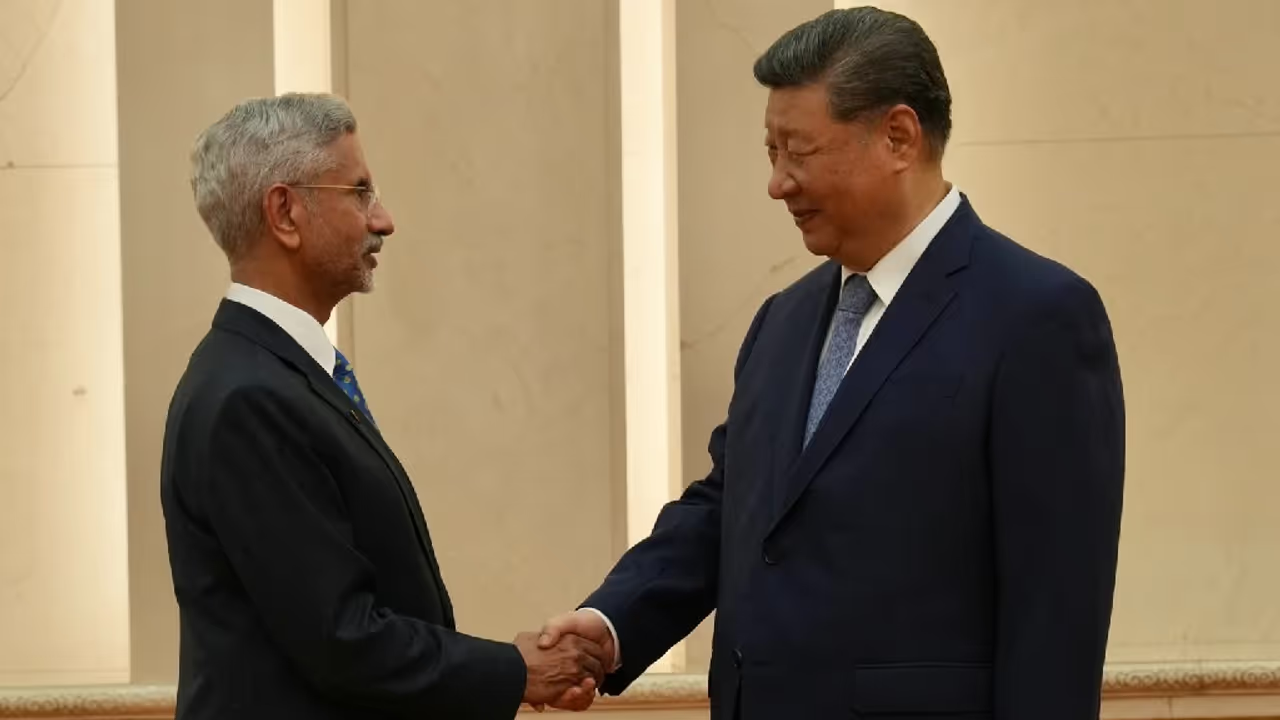Five years after the Galwan clash, EAM S Jaishankar’s meeting with Chinese President Xi Jinping signals a cautious diplomatic reset between India and China amid shifting global equations.
In a quiet hall in Beijing, against the backdrop of red flags and shifting global alliances, External Affairs Minister S Jaishankar stood alongside his counterparts from SCO nations and shook hands with Chinese President Xi Jinping. It wasn’t just another diplomatic photo-op—it was a deliberate moment of engagement, five years after Galwan turned the India-China border into a zone of mistrust and sorrow.

Jaishankar’s brief, formal post on social media later summed it up in measured tones: "Called on President Xi Jinping this morning in Beijing along with my fellow SCO Foreign Ministers. Conveyed the greetings of President Droupadi Murmu & Prime Minister @narendramodi. Apprised President Xi of the recent development of our bilateral ties. Value the guidance of our leaders in that regard."
But behind the crisp diplomacy lay months—perhaps years—of careful recalibration.
The Long Road from Galwan
One cannot forget how deep the scars of Galwan run. For both nations, the 2020 military clash in the icy Himalayan valley wasn’t just another border skirmish—it was a psychological shock. Soldiers lost their lives, and trust, already fragile, collapsed. Since then, both countries have tiptoed around each other, keeping the diplomatic doors barely ajar.
Now, five years later, Jaishankar’s visit—the first by an Indian External Affairs Minister to China since that deadly clash—is not just symbolic. It’s strategic.
“Conflict Management Has Become Very Critical”
What adds real weight to this visit is the context. The world is in flux. Traditional allies are rethinking their commitments, while new rivalries and alliances form across continents. For India, this is not the time to leave things unresolved on its northern frontier.
Major General Ashok Kumar (Retd), Director General of the Centre for Joint Warfare Studies (CENJOWS), told Asianet News English: "The meeting between our EAM Jaishankar with Chinese leadership assumes a great significance as world is undergoing major geo-political churns. Even the trusted friends are realigning their strategies and therefore conflict management has become very critical till the time the nation is self reliant on all important domains."
“The necessity of resolving the border issue along with maintaining peace and tranquility has been highlighted by India,” he added.
In other words, India cannot afford to be distracted or dependent. Managing the China challenge—even if it means inch-by-inch dialogue—is imperative.
Strategic Signals, Cultural Diplomacy
Jaishankar’s visit wasn’t limited to the ceremonial meeting with Xi Jinping. It followed a series of high-level engagements—with Foreign Minister Wang Yi and Vice President Han Zheng—where deeper, more candid discussions took place.
"Held detailed talks with Politburo Member and FM Wang Yi in Beijing this evening. Spoke about the need for a far-seeing approach to bilateral ties and building a stable & constructive relationship," Jaishankar had posted earlier. "Incumbent on us to address aspects related to the border, normalizing people-to-people exchanges and avoiding restrictive trade measures & roadblocks."
“Positive Signals” from India—But Will China Respond?
Jaishankar’s tone throughout the visit has been firm but not antagonistic. It reflects a policy of engagement without naivety. India is making it clear that the reconciliation process—sparked by a brief meeting between PM Modi and President Xi during the BRICS Summit in Russia—is serious business.
As Major General Ashok Kumar (Retd) points out, India has shown its cards. “India has given positive signals to carry forward the reconciliation process set into motion in Oct 24. At the same time, India has asked China to restore direct flights to Kailas Mansarovar, allow export of rare earth elements and high end fertilizers,” he told Asianet News English.
But it takes two to move forward. And China, facing its own internal economic slowdowns and diplomatic challenges, may be more willing now than before.
"Given the internal dynamics of China, it may be more amenable to address the Indian concerns," Major General Ashok Kumar (Retd) added.
For now, this isn’t a grand breakthrough. But it is a carefully plotted reset—one that acknowledges pain, prioritises stability, and keeps dialogue alive.
Jaishankar’s Beijing visit, framed within the SCO’s multilateral setting, offers India both cover and clarity. It shows that while India will never forget Galwan, it also understands that lasting peace is built not in silence, but in conversation.


